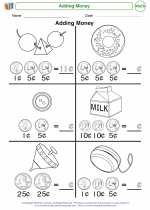Constants
In mathematics, a constant is a value that does not change. It is a fixed number or a fixed quantity that remains the same in all circumstances. Constants are used in various mathematical expressions, equations, and formulas.
Types of Constants
There are different types of constants, including:
- Numeric Constants: These are specific numerical values, such as 3, 5, 7, etc.
- Physical Constants: These are fixed values used in scientific calculations, such as the speed of light (c) or the gravitational constant (G).
- Mathematical Constants: These are important mathematical values, such as π (pi), e (Euler's number), or the golden ratio.
Examples of Constants
Here are some examples of constants:
- The value of π (pi) is a mathematical constant approximately equal to 3.14159.
- The speed of light in a vacuum, denoted by c, is a physical constant with a value of approximately 299,792,458 meters per second.
- The gravitational constant, denoted by G, is a physical constant with a value of approximately 6.674 × 10-11 m3 kg-1 s-2.
Importance of Constants
Constants play a crucial role in various mathematical and scientific calculations. They provide fixed reference points and allow for consistent and accurate results in mathematical expressions and scientific theories.
.◂Math Worksheets and Study Guides Kindergarten. Adding Money
The resources above cover the following skills:
Measurement and Data
Work with time and money.


